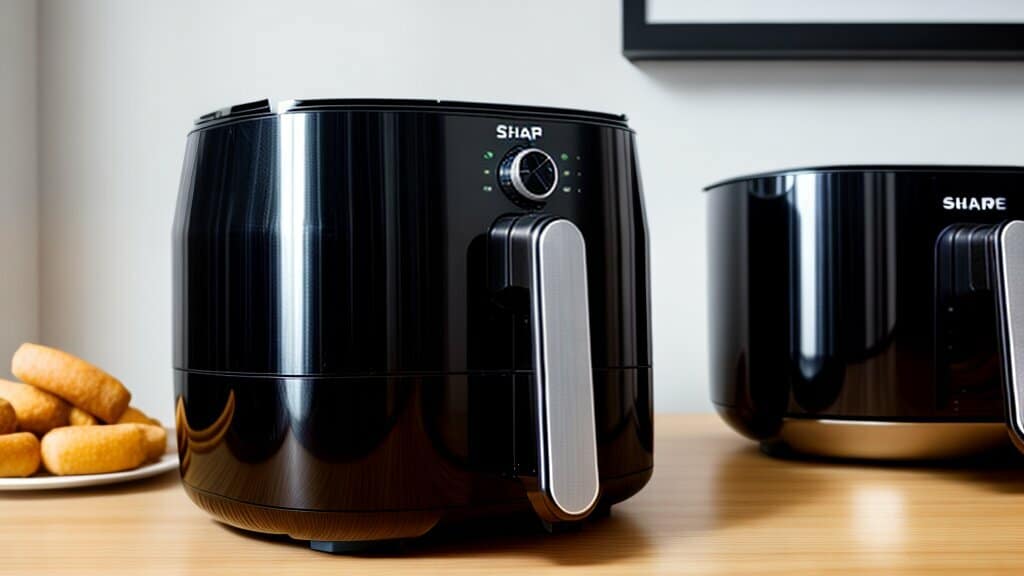
As a professional copywriting journalist, I’ve often come across people questioning the power consumption of their kitchen appliances. One question that often arises when it comes to air fryers is – “How many watts does an air fryer use?”
Well, the answer isn’t straightforward, as it depends on various factors like the size and model of the air fryer. However, understanding the wattage of an air fryer is crucial in estimating its power consumption and managing your energy costs better.
Key Takeaways:
- The wattage of an air fryer plays a significant role in determining its power consumption.
- The typical range of watts used by air fryers varies from 800 to 1500 watts.
Understanding Air Fryer Wattage
When it comes to air fryers, wattage refers to the amount of power the appliance uses to operate. The wattage of an air fryer can range from 800 to 2200 watts, with most models falling between 1200 and 1700 watts. Understanding the wattage of an air fryer is important because it affects how much electricity the appliance consumes.
Wattage is a measure of electrical power, which is calculated by multiplying the voltage (in volts) by the current (in amperes). The power rating of an air fryer is determined by the amount of energy it requires to operate, and this is reflected in its wattage.
Factors That Affect Air Fryer Wattage
Several factors can influence the wattage rating of an air fryer. Some of these factors include:
- The size of the air fryer: Larger air fryers tend to have higher wattage ratings than smaller ones.
- The cooking functions: Air fryers that have multiple cooking functions, such as baking and grilling, may have higher wattage ratings due to the added power needed for these functions.
- The quality of the heating element: Higher-quality heating elements may require less power to operate at the same cooking temperature.
Choosing the Right Wattage
Choosing the right wattage for your air fryer depends on several factors, including the size of your household, your cooking needs, and your energy consumption goals. If you’re cooking for a small family and don’t plan on using your air fryer frequently, a model with lower wattage may be sufficient. However, if you plan on using your air fryer frequently to cook for a large family or to prepare meals with multiple functions, a higher wattage model may be more suitable.
It’s important to note that higher wattage models may consume more electricity, resulting in higher energy costs. Therefore, it’s recommended to choose the wattage based on your specific needs to optimize both energy usage and cooking performance.
Energy Efficiency of Air Fryers
When it comes to purchasing appliances, the energy efficiency of a product should be a key consideration. Air fryers are no exception. Models can vary in their energy-saving features, so it’s important to do some research before making a purchase.
One way to determine the energy efficiency of an air fryer is by looking at its wattage. Generally, air fryers with lower wattage ratings use less energy. However, this can also impact the cooking time and overall performance of the appliance.
In addition to wattage, other factors such as insulation, fan speed, and temperature control can also affect energy efficiency. Some air fryers come with energy-saving features, such as automatic shut-off or standby modes, which can help reduce electricity usage.
Maximizing the energy efficiency of your air fryer can also be achieved through proper use and maintenance. Keeping the fryer clean, removing excess food particles, and using the correct temperature and cook times can help reduce energy consumption.
When choosing an air fryer, consider your specific needs and preferences. If energy efficiency is a priority, look for models with lower wattage and energy-saving features. By being mindful of energy usage, you can enjoy the benefits of air frying without breaking the bank on your electricity bill.
Tips for Energy-Saving Air Fryer Usage
As an air fryer enthusiast, I have learned some tips and tricks for optimizing energy usage without sacrificing taste. Here are some of my recommendations:
- Adjust the cooking time: Overcooking your food not only ruins its taste but also wastes energy. Keep an eye on your food and adjust the cooking time accordingly. Experiment with different cooking times to find the perfect balance.
- Preheat only when necessary: Preheating your air fryer is not always necessary, especially for shorter cooking times. Skip the preheating step when possible to avoid wasting energy.
- Use the right temperature: Check the recommended temperature for your food and adjust it accordingly. Overheating your air fryer consumes more energy, and it can result in burnt or dry food.
- Cook in batches: Instead of cooking small amounts of food multiple times, try cooking in batches. This way, you can maximize the energy usage and save on electricity bills.
- Choose energy-saving models: If you’re in the market for a new air fryer, consider models with energy-saving features, such as automatic shut-off and timer functions. These models are designed to reduce energy waste and save you money in the long run.
By following these simple tips, you can easily reduce the energy consumption of your air fryer without compromising on taste or convenience.
Monitoring Air Fryer Power Consumption
As someone who is conscious about energy usage, monitoring the power consumption of your air fryer is important for understanding how much electricity it is using. To calculate the energy usage of your air fryer, you will need to know its wattage and how long you are using it for.
For example, if your air fryer uses 1500 watts and you use it for 30 minutes per day, you would multiply 1500 by 0.5 (30 minutes divided by 60 minutes) to get the daily energy consumption of 750 watt-hours. You can then multiply this number by the cost of electricity per kWh (kilowatt-hour) in your area to estimate the daily or monthly operating cost of your air fryer.
Tracking and managing the energy costs of your air fryer can help you save money on your electricity bill and reduce your environmental impact. Consider using a smart plug meter or a power monitoring device to keep track of your air fryer’s energy usage and identify opportunities for energy efficiency improvements.
Conclusion
In today’s world, energy usage is a crucial factor to consider when using household appliances. When it comes to air fryers, understanding their wattage and power consumption can go a long way in managing your electricity costs and reducing your environmental impact.
Throughout this article, we have explored the topic of air fryer wattage and its importance in energy efficiency. We have discussed how to choose the right wattage for your needs, tips for energy-saving usage, and how to monitor your air fryer’s power consumption.
By paying attention to these factors, you can enjoy the benefits of air frying while being mindful of your energy consumption. Plus, with the abundance of energy-efficient air fryers on the market, you can choose a model that aligns with your environmental values and budget.
So next time you use your air fryer, remember to keep these tips in mind to make the most out of its energy-saving potential. Happy air frying!
FAQ
Q: How many watts does an air fryer use?
A: The wattage of an air fryer can vary depending on the model, but on average, most air fryers use between 800 and 1500 watts.
Q: What is air fryer wattage and why is it important?
A: Air fryer wattage refers to the amount of electrical power consumed by the appliance. It is important to understand the wattage of an air fryer as it affects energy usage and can impact your electricity costs.
Q: How do I choose the right wattage for my air fryer?
A: When selecting an air fryer, consider your cooking needs and the size of your household. Smaller air fryers with lower wattage may be sufficient for individuals or couples, while larger families may require higher wattage models to meet their cooking demands.
Q: Are air fryers energy-efficient?
A: Yes, air fryers are generally considered to be energy-efficient appliances. They use hot air circulation to cook food, requiring less energy compared to traditional frying methods.
Q: How can I use my air fryer in an energy-saving manner?
A: To use your air fryer more efficiently, avoid overcrowding the basket, preheat when necessary, and adjust cooking times and temperatures based on the recipe. These simple practices can help save energy without compromising on taste.
Q: Is it possible to monitor air fryer power consumption?
A: While air fryers do not typically have built-in power monitoring features, you can calculate power consumption by using a wattage meter. This can help you track and manage your energy costs associated with using the air fryer.
- Make These 10 Delicious Appetizers in Your Air Fryer - September 22, 2023
- How to Cook Lamb Shoulder Chops in Air Fryer? - September 13, 2023
- How to Cook Crinkle Fries in Air Fryer? - September 13, 2023
